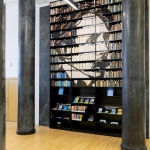

On 23–24 November, the Martynas Mažvydas National Library of Lithuania held the annual conference ‘Political Leadership in a Parliamentary Democracy’. This year marks the 30th anniversary of this Library’s statutory function as a parliamentary library. To quote the Library’s Director-General Prof. Renaldas Gudauskas, ‘It is a very good opportunity to evaluate at how far we have come and, through united insights by best experts and policymakers, envision future action strategies as well as further develop the parliamentary library function as one of the priorities within the general cultural policy’.
The international research conference had the purpose to look at how the National Library contributes and could contribute to the national progress by performing its function of a parliamentary library. The participants were listening to presentations and discussing ways to improve political leadership, fortify the principle of active involvement into social and political life as well as about what must be transformed in order to ensure that cultural topics were not merely a compulsory attribute of political programmes but recovered their proper position within the state architecture.
In her welcoming speech, the Speaker of the Seimas of the Republic of Lithuania the conference’s patroness Viktorija Čmilytė-Nielsen emphasised the role of political leadership and high-quality information services in today’s world. Ms Čmilytė-Nielsen wished that the institutional leadership will be sustained and the spectre of research broadened in order to satisfy the information needs of the parliament: ‘What makes political leadership effective is monitoring and, in particular, analysis of social, political, and cultural process. Therefore only those politicians, state officials, and civil servants who are guided by data and acquire knowledge will tackle much more serious challenges related to crisis management, social conflicts, and internal and external communication. In this respect, the National Library’s role is exceptional, and it a pleasant fact that the active inter-institutional cooperation building on the tradition of a parliamentary library, continues to positively develop’.
In her speech, Antonia Arahova, President-elect of the International Federation of Library Associations and Institutions (IFLA) (2021–2023) and President of the General Council for Libraries (Greece), wished great success to ‘this important congress’ in Lithuanian as well as emphasised great international expertise of the National Library’s Director-General Prof. Dr. Renaldas Gudauskas and the potential of the Library’s staff. IFLA’s President also spoke about political leadership, parliamentary democracy, and the role of libraries: ‘Of exceptional importance for political leadership is analysis of actions and the capability to assess consequences of decisions and foresee at least a few steps ahead. We think that it is worth the effort, especially in the constantly changing realities today’s pandemic. Our libraries are capable of meeting this encounter and, therefore, we could hope that the future will be lighter and more interesting than we have imagined’.
The Chair of the Committee on Culture of the Seimas of the Republic of Lithuania Vytautas Juozapaitis said that every leader is responsible for his decisions, activities, and political language and the choice of words. He said that ‘The National Library is the generator, accumulator, and aggregator of information and knowledge contributing to politicians’ performing their roles well. The National Library closely cooperates with the parliament and provides it with high-quality analytical information. In other words, the Library, which possesses abundant and trustful information sources, has become an important partner of public authorities in legislative processes. We are pleased to have become not only partners but also friends’, said Vytautas Juozapaitis.
In his welcoming speech, the Minister of Culture of the Republic of Lithuania Simonas Kairys said that all of us both create and use the information and, therefore, should know how to analyse, evaluate, and collect it as well as retain critical thinking abilities: ‘Access to information and the ability to analyse it is very important for today’s politicians and civil servants. Therefore I greatly appreciate the National Library’s tradition, which allows us to escape the fragmentary vision of the world, strengthen democratic processes, and better equip ourselves during information wars’, said the Minister Juozapaitis.
The Director-General of the National Library Prof. Dr. Renaldas Gudauskas briefly surveyed the main trends and functions of the performance of the parliamentary library and identified future guidelines. ‘The previous thirty years of intensive activities and cooperation with principal public authorities have created the conditions for the Library’s new qualitative breakthrough. This anniversary presents a favourable opportunity for reflecting our strategy and undertaking leadership in refining the parliamentary library function. Though the changing realities are challenging us in various unpredictable ways, we continue to trust our potential in making a long-term economic, social, and cultural impact on the whole of Lithuania’, said Professor Gudauskas.
In the words of the National Library’s chief executive, ‘The parliamentary function of the Library will be further enhanced, and there will be further development of intellectual products and services, on the basis of which external stakeholders and analysts will be able to search for legislative acts produced by various institutions in real time and on the 24/7 basis. We will also offer and develop products of new forms and formats, develop information analysis services, and enrich and widen the spectre of research’.
Among the participants of the international research conference, there were experts and representatives from the fields of politics, academia, and the cultural community. Presentations were delivered by scholars and researchers from the Universities of London, Riga, and Sofia; Sciences Po Law School in Paris; the Centre for European Studies and Comparative Politics; the General Vytautas Žemaitis Military Academy of Lithuania; Vilnius Gediminas Technical University; Vytautas Magnus University; Vilnius University; and the National Library.
The discussions covered urgent issues: communication and philosophy of the political leadership against the background of the democratic parliamentarism, communication of public authorities, the transformation of information policy. Information services for legislators, the role and experiences of national libraries during a social crisis, interaction of decision making and information services. The role of public analytical centres, etc.
All presentations and discussions are available online:
See more information about the conference, speakers, and presentations: here.



